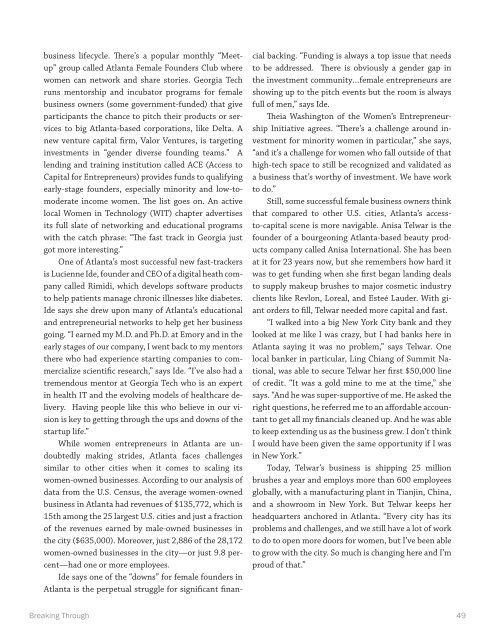BREAKING THROUGH
YWkgl
YWkgl
You also want an ePaper? Increase the reach of your titles
YUMPU automatically turns print PDFs into web optimized ePapers that Google loves.
usiness lifecycle. There’s a popular monthly “Meetup”<br />
group called Atlanta Female Founders Club where<br />
women can network and share stories. Georgia Tech<br />
runs mentorship and incubator programs for female<br />
business owners (some government-funded) that give<br />
participants the chance to pitch their products or services<br />
to big Atlanta-based corporations, like Delta. A<br />
new venture capital firm, Valor Ventures, is targeting<br />
investments in “gender diverse founding teams.” A<br />
lending and training institution called ACE (Access to<br />
Capital for Entrepreneurs) provides funds to qualifying<br />
early-stage founders, especially minority and low-tomoderate<br />
income women. The list goes on. An active<br />
local Women in Technology (WIT) chapter advertises<br />
its full slate of networking and educational programs<br />
with the catch phrase: “The fast track in Georgia just<br />
got more interesting.”<br />
One of Atlanta’s most successful new fast-trackers<br />
is Lucienne Ide, founder and CEO of a digital heath company<br />
called Rimidi, which develops software products<br />
to help patients manage chronic illnesses like diabetes.<br />
Ide says she drew upon many of Atlanta’s educational<br />
and entrepreneurial networks to help get her business<br />
going. “I earned my M.D. and Ph.D. at Emory and in the<br />
early stages of our company, I went back to my mentors<br />
there who had experience starting companies to commercialize<br />
scientific research,” says Ide. “I’ve also had a<br />
tremendous mentor at Georgia Tech who is an expert<br />
in health IT and the evolving models of healthcare delivery.<br />
Having people like this who believe in our vision<br />
is key to getting through the ups and downs of the<br />
startup life.”<br />
While women entrepreneurs in Atlanta are undoubtedly<br />
making strides, Atlanta faces challenges<br />
similar to other cities when it comes to scaling its<br />
women-owned businesses. According to our analysis of<br />
data from the U.S. Census, the average women-owned<br />
business in Atlanta had revenues of $135,772, which is<br />
15th among the 25 largest U.S. cities and just a fraction<br />
of the revenues earned by male-owned businesses in<br />
the city ($635,000). Moreover, just 2,886 of the 28,172<br />
women-owned businesses in the city—or just 9.8 percent—had<br />
one or more employees.<br />
Ide says one of the “downs” for female founders in<br />
Atlanta is the perpetual struggle for significant financial<br />
backing. “Funding is always a top issue that needs<br />
to be addressed. There is obviously a gender gap in<br />
the investment community…female entrepreneurs are<br />
showing up to the pitch events but the room is always<br />
full of men,” says Ide.<br />
Theia Washington of the Women’s Entrepreneurship<br />
Initiative agrees. “There’s a challenge around investment<br />
for minority women in particular,” she says,<br />
“and it’s a challenge for women who fall outside of that<br />
high-tech space to still be recognized and validated as<br />
a business that’s worthy of investment. We have work<br />
to do.”<br />
Still, some successful female business owners think<br />
that compared to other U.S. cities, Atlanta’s accessto-capital<br />
scene is more navigable. Anisa Telwar is the<br />
founder of a bourgeoning Atlanta-based beauty products<br />
company called Anisa International. She has been<br />
at it for 23 years now, but she remembers how hard it<br />
was to get funding when she first began landing deals<br />
to supply makeup brushes to major cosmetic industry<br />
clients like Revlon, Loreal, and Esteé Lauder. With giant<br />
orders to fill, Telwar needed more capital and fast.<br />
“I walked into a big New York City bank and they<br />
looked at me like I was crazy, but I had banks here in<br />
Atlanta saying it was no problem,” says Telwar. One<br />
local banker in particular, Ling Chiang of Summit National,<br />
was able to secure Telwar her first $50,000 line<br />
of credit. “It was a gold mine to me at the time,” she<br />
says. “And he was super-supportive of me. He asked the<br />
right questions, he referred me to an affordable accountant<br />
to get all my financials cleaned up. And he was able<br />
to keep extending us as the business grew. I don’t think<br />
I would have been given the same opportunity if I was<br />
in New York.”<br />
Today, Telwar’s business is shipping 25 million<br />
brushes a year and employs more than 600 employees<br />
globally, with a manufacturing plant in Tianjin, China,<br />
and a showroom in New York. But Telwar keeps her<br />
headquarters anchored in Atlanta. “Every city has its<br />
problems and challenges, and we still have a lot of work<br />
to do to open more doors for women, but I’ve been able<br />
to grow with the city. So much is changing here and I’m<br />
proud of that.”<br />
Breaking Through 49


